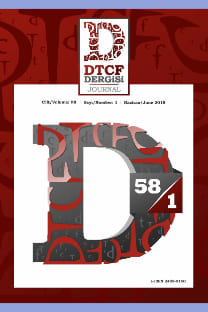JOHN CHRISTOPHER'IN “EMPTY WORLD” ROMANI ÜZERİNE NİETZSCHECİ BİR DEĞERLENDİRME
John Christopher'ın Empty World (1977) eseri ölümcül bir salgını çocukların gözünden aktaran bir apokaliptik romandır. Özel anlamda, hikâye, ailesini kaybeden ve yalnızlığını gidermek amacıyla Londra'nın sokaklarını alt üst eden ve ıssız bir şehirde hayatta kalma mücadelesi veren on beş yaşındaki Neil Miller'ın penceresinden sunulmaktadır. Sonunda kendi yaşlarında iki kız olan Lucy ve Billie ile tanışan Neil, onlarla birlikte yaşamaya karar verir. Bu çalışma Christopher'ın Empty World eserini felsefi bir açıdan, özellikle Nietzscheci bir bakış açısıyla analiz etmeyi amaçlamaktadır. Friedrich Nietzsche sosyal ve beşerî bilimlerin tüm alanlarını büyük ölçüde etkilemiş bir düşünürdür. Bu bağlamda makale Nietzsche'nin ileri sürdüğü: güç istenci, ebedi döngü ve amor fati doktrinlerini tartışmaktadır. Bu üç kavram, Nietzsche'nin kozmolojik teorisi ve metafizik hipotezinde birbiriyle bağlantılıdır. Sonuç olarak, bu makalenin temel amacı Christopher'ın Empty World romanında Nietzsche'ye ait söz konusu doktrinlerin nasıl ve ne ölçüde tezahür ettiklerini açığa çıkarmaktır. Bu tezahürler, romanın zaman, mekân ve yaygın temalarının ışığında metne yapılan göndermelerle tartışılacaktır.
A NIETZSCHEAN INQUIRY INTO JOHN CHRISTOPHER'S “EMPTY WORLD”
John Christopher's Empty World (1977) is an apocalyptic novel which depicts a fatalpandemic through the eyes of adolescent children. In specific, the story is presentedthrough the perspective of fifteen-year-old Neil Miller who loses his family and heads off tothe streets of London to seek company in his quest for survival in a desolated city. Neilfinally meets Lucy and Billie, two girls his age and the children then decide to move intogether. This study aims to analyse Christopher's Empty World from a philosophical, inparticular, Nietzschean point of view. Friedrich Nietzsche is a philosopher who had animmense impact in all areas of the social sciences and the humanities. This article therebydiscusses three Nietzschean doctrines: the will to power, the eternal recurrence and amorfati. All these three notions are interrelated in Nietzsche's cosmological theory and hismetaphysical hypothesis. Thus, the ultimate purpose of this article is to reveal how and towhat extent Nietzschean doctrines are manifested in John Christopher's Empty World.These manifestations will be discussed with relevant references to the text in associationwith the setting and prevalent themes of the novel.
___
- Atasoy, Emrah. “Spekülatif Kurguda Salgın Teması.” Ankara University Journal of the Faculty of Languages and History-Geography 60.2 (2020): 672-685. Web. 20 January 2021.
- Brodsky, Garry. “Nietzsche’s Notion of Amor Fati.” Continental Philosophy Review 31.1 (1998): 35-57. Web. 16 February 2021.
- Christopher, John. Empty World. New York: Simon & Schuster, 2015.
- Clasen, Mathias. “Imagining the End of the World: A Biocultural Analysis of PostApocalyptic Fiction.” Evolution and Popular Narrative. Boston: Brill, 2019. 69- 82. Web. 20 December 2020.
- Cunningham, Gustavus Watts. “On Nietzsche's Doctrine of the Will to Power.” The Philosophical Review 28. (1919): 479-490. Web. 5 September 2020.
- Dolson, Grace Neal. "The Influence of Schopenhauer upon Friedrich Nietzsche." The Philosophical Review, 10.3 (1901): 241-250. Web. 10 May 2021.
- Han-Pile, Béatrice. “Nietzsche and Amor Fati.” European Journal of Philosophy 19.2 (2011): 224-261. Web. 19 October 2020.
- Heidegger, Martin. Nietzsche: Volumes One and Two. New York: HarperCollins, 1991.
- Janaway, Christopher. Willing and Nothingness: Schopenhauer as Nietzsche's Educator. Oxford University Press, 1998.
- Joullié, Jean-Etienne. Will to Power, Nietzsche's Last Idol. Basingstoke: Springer, 2013.
- Kain, Philip Joseph. “Nietzsche, Eternal Recurrence, and the Horror of Existence.” The Journal of Nietzsche Studies 33.1 (2007): 49-63. Web. 25 January 2021.
- Koç, Evrim Ersöz. “The Duality of Hope and Despair: Thornton Wider’s Apocalyptic Vision in the Skin of our Teeth.” DEU Journal of GSSS 13.2 (2011): 83-95. Web. 10 February 2021.
- Kılıç, Sinan. “The Eternal Recurrence as Difference in Nietzsche’s Metaphysics.” Temasa Journal of Philosophy 9 (2018): 19-38. Web. 12 November 2020.
- Loeb, Paul. “Eternal Recurrence.” The Oxford Handbook of Nietzsche. New York: Oxford University Press, 2013. 645-671. Web. 20 September 2020.
- Milona, Michael. “Philosophy of Hope.” Historical and Multidisciplinary Perspectives on Hope, New York: Springer, 2020. 99-116. Web. 6 January 2021.
- Mollison, James. “Nietzsche Contra Stoicism: Naturalism and Value, Suffering and Amor Fati.” Inquiry 62.1 (2018): 93-115. Web. 25 February 2021.
- Nehamas, Alexander. “The Eternal Recurrence.” The Philosophical Review 89.3 (1980): 331-356. Web. 10 September 2020.
- Nietzsche, Friedrich. Beyond Good & Evil: Prelude to a Philosophy of the Future. Trans. Walter Kaufmann. New York: Vintage, 2010.
- ---. On the Genealogy of Morals: Ecce Homo. Trans. Walter Kaufmann. New York: Vintage, 1967.
- ---. The Gay Science: With a Prelude in Rhymes and an Appendix of Songs. New York: Vintage, 1974.
- Nietzsche, Friedrich, and Walter Kaufmann. The Will to Power: A New Translation. Trans. R. J. Hollingdale. New York: Random House, 1967.
- Peters, Charles Clinton. “Friedrich Nietzsche and His Doctrine of Will to Power.” Monist 21.3 (1911): 357-375. Web. 17 October 2020.
- Pippin, Robert. Nietzsche: Thus Spoke Zarathustra. Cambridge: Cambridge University Press, 2006.
- Solomon, Robert. “Nietzsche on Fatalism and “Free Will”.” The Journal of Nietzsche Studies 23.1 1 Mar. (2002): 63-87. Web. 27 December 2020.
- Tilburg, Theo Van, and Pearl Dykstra. “Loneliness and Social Isolation.” The Cambridge Handbook of Personal Relationships. Cambridge: Cambridge University Press, 2006. 485-500. Web. 28 January 2021.
- ISSN: 0378-2905
- Yayın Aralığı: Yılda 2 Sayı
- Başlangıç: 1942
- Yayıncı: Ankara Üniversitesi Dil ve Tarih-Coğrafya Fakültesi
Sayıdaki Diğer Makaleler
YENİLENEBİLİR ENERJİNİN ÖNEMİ VE LATİN AMERİKA COĞRAFYASINDAKİ YERİ: BREZİLYA ÖRNEĞİ
İRONİ VE FARKINDALIKLA DİNO BUZZATİ
PLATON'UN ŞÖLEN'İNDE EROS, ERDEM VE EĞİTİM İLİŞKİSİ
EDEBİYATTAN BEYAZ PERDEYE TÜR BELİRLEYİCİ KİŞİLER
DORIS LESSING'İN “ALTIN DEFTER” ADLI ROMANINDA ÖZGÜR KADIN ÇELİŞKİSİ
KÂMİL KAHRAMAN “MECNÛN”DAN HAREKETLE SEYR-İ SÜLÛK, BİREYLEŞME SÜRECİ VE MONOMİTİN ÇEKİRDEĞİ
KAZUO ISHIGURO'NUN “BİR AİLE YEMEĞİ” BAŞLIKLI ÖYKÜSÜNDE PİNTERESK ÖĞELER
ROBERT HENRYSON'IN “MORALL FABILLIS” ESERİNDE İNSAN-HAYVAN DEĞİŞİMLERİ
DEĞİŞMEKTE OLAN İRLANDA VE İRLANDALI KİMLİĞİ: CONOR MCPHERSON'IN “THE WEIR” ADLI OYUNU
